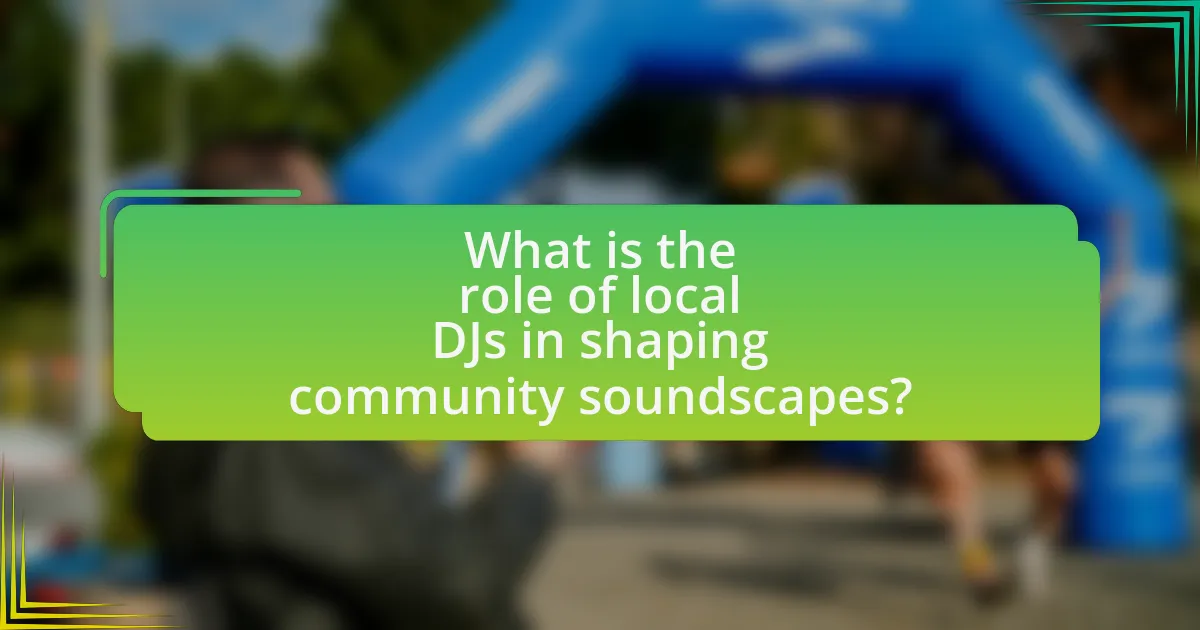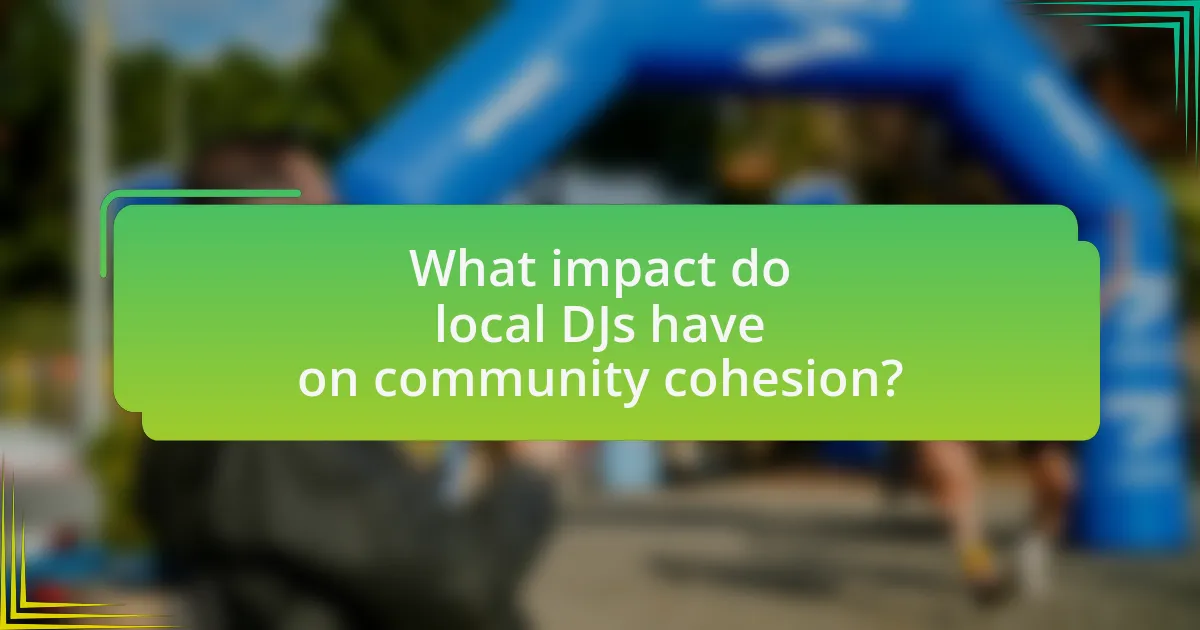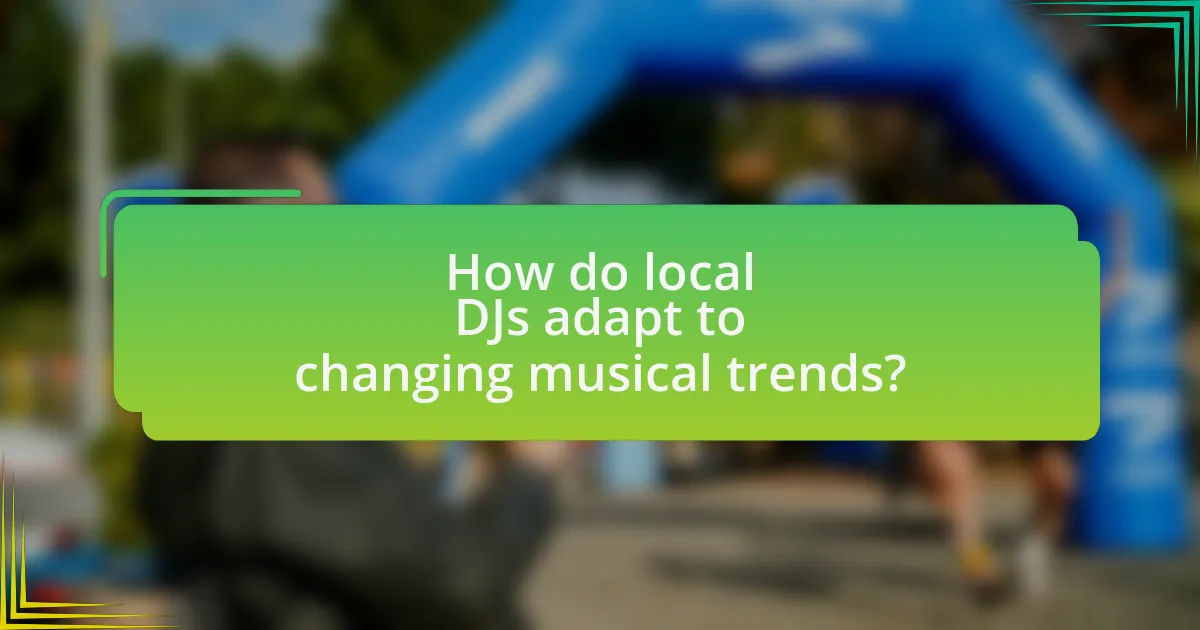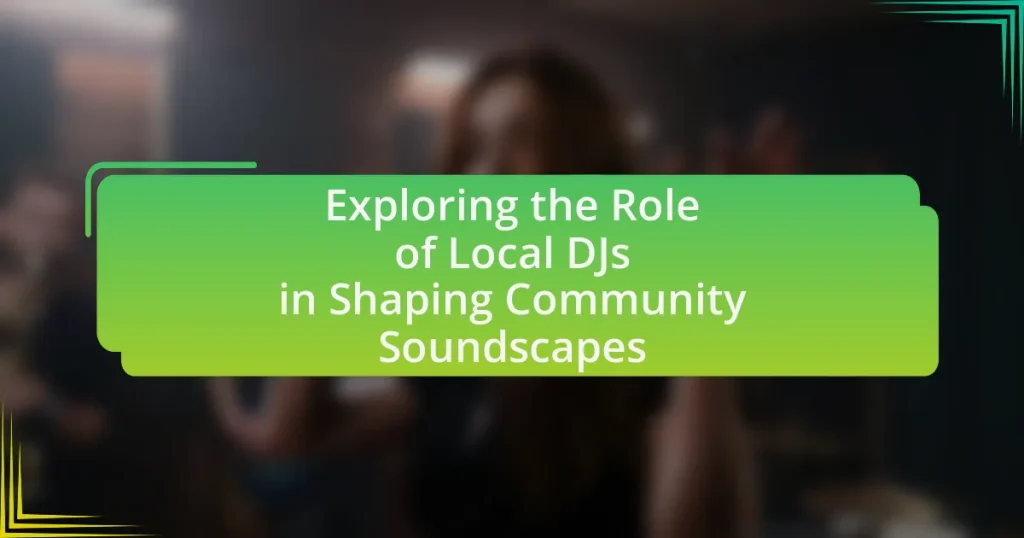Local DJs play a vital role in shaping community soundscapes by curating music that reflects local cultural identities and preferences. They act as cultural ambassadors, promoting specific genres like house, techno, hip-hop, and reggae, while also preserving traditional music forms. Through their engagement in community events, local DJs foster social connections and inclusivity, enhancing the sense of belonging among residents. However, they face challenges such as limited access to venues and competition from larger events, which can impact their sustainability. The article explores these dynamics, highlighting the influence of local DJs on musical identity, community cohesion, and their adaptation to changing trends.

What is the role of local DJs in shaping community soundscapes?
Local DJs play a crucial role in shaping community soundscapes by curating and mixing music that reflects the cultural identity and preferences of their local audience. They act as cultural ambassadors, selecting tracks that resonate with the community’s values, experiences, and social dynamics. This influence is evident in events such as local festivals and club nights, where DJs create atmospheres that foster social interaction and community bonding. Research indicates that local DJs often incorporate regional music styles and genres, which helps to preserve and promote local culture, as seen in the rise of genres like Chicago house and Detroit techno, which originated from local scenes. By engaging with their audience and responding to their tastes, local DJs not only enhance the auditory landscape but also contribute to the overall sense of place and belonging within the community.
How do local DJs influence the musical identity of their communities?
Local DJs significantly influence the musical identity of their communities by curating and promoting specific genres and styles that resonate with local culture. They act as cultural ambassadors, introducing new sounds while also preserving traditional music forms, thereby shaping the community’s collective musical taste. For instance, in cities like Detroit, local DJs have played a crucial role in the evolution of techno music, which has become a defining characteristic of the city’s identity. Additionally, studies show that local DJs often collaborate with local artists, fostering a sense of community and encouraging the development of homegrown talent, which further solidifies the unique musical landscape of the area.
What genres do local DJs typically promote within their communities?
Local DJs typically promote genres such as house, techno, hip-hop, and reggae within their communities. These genres are often chosen due to their popularity and cultural significance in local nightlife and events. For instance, house and techno are prevalent in urban areas known for electronic music scenes, while hip-hop reflects the cultural narratives and experiences of local communities. Reggae often resonates in areas with Caribbean influences, showcasing the diversity of musical tastes that local DJs cater to.
How do local DJs select music that resonates with their audience?
Local DJs select music that resonates with their audience by analyzing crowd reactions, understanding local music trends, and curating playlists that reflect the preferences of their community. They often observe the energy levels and responses of attendees during performances, adjusting their selections in real-time to maintain engagement. Additionally, local DJs stay informed about popular genres and emerging artists within their area, which helps them connect with the cultural identity of their audience. This approach is supported by studies indicating that audience engagement significantly increases when DJs play familiar and locally relevant tracks, enhancing the overall experience and fostering a sense of community.
Why are local DJs considered cultural ambassadors?
Local DJs are considered cultural ambassadors because they curate and promote music that reflects the unique identity and heritage of their communities. By selecting tracks that resonate with local traditions and contemporary influences, DJs foster a sense of belonging and cultural among residents. For instance, in cities like Detroit, DJs have played a pivotal role in popularizing genres such as techno, which originated there, thereby reinforcing the city’s cultural significance in the music landscape. Additionally, local DJs often collaborate with artists and community events, further bridging cultural gaps and enhancing social cohesion.
In what ways do local DJs reflect the cultural diversity of their communities?
Local DJs reflect the cultural diversity of their communities by incorporating various musical genres, styles, and cultural influences into their sets. They often blend traditional music from different cultures with contemporary sounds, creating a unique auditory experience that resonates with a diverse audience. For example, a DJ in a multicultural urban area might mix Afrobeat, Latin rhythms, and hip-hop, showcasing the rich tapestry of cultural backgrounds present in the community. This practice not only celebrates diversity but also fosters inclusivity, as it allows individuals from different backgrounds to connect through shared musical experiences. Additionally, local DJs frequently collaborate with artists from various cultural backgrounds, further amplifying the representation of diverse voices and sounds in their performances.
How do local DJs engage with community events and gatherings?
Local DJs engage with community events and gatherings by providing music that reflects the cultural and social dynamics of the area. They often perform at local festivals, parties, and public events, creating an atmosphere that fosters community interaction and celebration. For instance, many local DJs collaborate with event organizers to curate playlists that resonate with the audience, ensuring that the music enhances the overall experience. Additionally, local DJs frequently participate in charity events and fundraisers, using their platform to support community causes and initiatives. This involvement not only showcases their talent but also strengthens their connection to the community, making them integral to the local soundscape.

What impact do local DJs have on community cohesion?
Local DJs significantly enhance community cohesion by fostering social connections through music and events. They create inclusive spaces where diverse groups come together, promoting interaction and collaboration among community members. Research indicates that music events, particularly those featuring local DJs, can increase social capital by encouraging participation and engagement within the community. For instance, a study published in the Journal of Community Psychology found that community music events led by local artists, including DJs, resulted in stronger neighborhood ties and a greater sense of belonging among residents. This demonstrates that local DJs play a crucial role in building and maintaining community cohesion through their influence on social dynamics and cultural expression.
How do local DJs foster connections among community members?
Local DJs foster connections among community members by creating inclusive spaces for social interaction through music events. These DJs curate playlists that reflect the cultural diversity and preferences of the community, encouraging participation and engagement. For instance, community events organized by local DJs often feature genres that resonate with various demographic groups, promoting a sense of belonging. Additionally, local DJs frequently collaborate with other artists and organizations, further strengthening community ties and enhancing the local music scene. This collaborative approach not only builds networks among artists but also invites community members to connect over shared musical experiences, thereby reinforcing social bonds.
What role do local DJs play in creating inclusive spaces for different demographics?
Local DJs play a crucial role in creating inclusive spaces for different demographics by curating diverse music selections that resonate with various cultural backgrounds. They foster community engagement by promoting events that welcome individuals from different age groups, ethnicities, and social identities, thereby enhancing social cohesion. For instance, studies have shown that music can bridge cultural divides, as seen in events where DJs blend genres from different cultures, attracting a wider audience and encouraging interaction among attendees. This practice not only enriches the local music scene but also empowers marginalized voices by providing a platform for underrepresented artists, further solidifying the DJ’s role as a catalyst for inclusivity within the community.
How do local DJs contribute to the sense of belonging in their communities?
Local DJs contribute to the sense of belonging in their communities by creating inclusive spaces for social interaction and cultural expression. They curate music that resonates with local identities, fostering a shared experience among attendees at events and gatherings. Research indicates that music events organized by local DJs can enhance community cohesion, as they often reflect the diverse backgrounds and preferences of the community members. For instance, a study published in the Journal of Community Psychology found that participation in local music events significantly increased feelings of connectedness among residents. By facilitating these communal experiences, local DJs play a vital role in strengthening social ties and promoting a sense of belonging within their neighborhoods.
What challenges do local DJs face in their communities?
Local DJs face several challenges in their communities, including limited access to venues, competition from larger events, and financial instability. Limited access to venues restricts their opportunities to perform, as many local establishments prioritize bigger acts or have stringent booking requirements. Competition from larger events often overshadows local talent, making it difficult for DJs to gain recognition and build a following. Financial instability arises from inconsistent gig availability and low pay rates, which can hinder their ability to invest in equipment and marketing. These factors collectively impact the sustainability of local DJs within their communities.
How do economic factors affect the work of local DJs?
Economic factors significantly influence the work of local DJs by affecting their income opportunities, event bookings, and overall market demand. For instance, during economic downturns, venues may reduce budgets for entertainment, leading to fewer gigs for DJs. Additionally, when disposable income is low, consumers are less likely to spend on nightlife, which directly impacts attendance at events where DJs perform. According to a 2020 report by the National Independent Venue Association, 90% of independent venues reported a significant decline in revenue due to economic challenges, illustrating how financial conditions can limit performance opportunities for local DJs.
What barriers do local DJs encounter in promoting their events?
Local DJs encounter several barriers in promoting their events, including limited marketing budgets, competition from larger venues and established artists, and challenges in reaching their target audience. Limited financial resources restrict their ability to invest in effective advertising channels, such as social media ads or promotional materials. Additionally, competition from well-known DJs and larger venues often overshadows local talent, making it difficult for them to attract attendees. Furthermore, local DJs may struggle with audience engagement due to a lack of established networks or platforms to effectively communicate their events, which can hinder their promotional efforts.

How do local DJs adapt to changing musical trends?
Local DJs adapt to changing musical trends by continuously updating their playlists and incorporating new genres and styles that resonate with their audience. They actively engage with their community through social media and live events to gauge listener preferences, allowing them to stay relevant. For instance, a study by the University of Southern California found that DJs who frequently interact with their audience are more successful in predicting and integrating emerging trends into their sets. This responsiveness not only enhances their performance but also strengthens their connection with the local music scene.
What strategies do local DJs use to stay relevant in the music scene?
Local DJs employ several strategies to remain relevant in the music scene, including networking, embracing technology, and curating unique experiences. Networking allows DJs to build relationships with other artists, venues, and promoters, which can lead to more gigs and collaborations. Embracing technology, such as using social media platforms and music streaming services, helps DJs reach wider audiences and showcase their work. Additionally, curating unique experiences through themed events or collaborations with local artists can attract diverse crowds and keep their performances fresh. These strategies are essential for maintaining visibility and engagement in a competitive music landscape.
How do local DJs incorporate new technologies into their performances?
Local DJs incorporate new technologies into their performances by utilizing digital audio workstations (DAWs), MIDI controllers, and software like Serato and Traktor to enhance their mixing capabilities. These tools allow DJs to manipulate sound in real-time, create unique remixes, and seamlessly blend tracks, which elevates the overall experience for the audience. For instance, a study by the International Journal of Music Technology highlights that DJs who use advanced software can access a vast library of sounds and effects, enabling them to innovate and adapt their sets to the crowd’s energy. This integration of technology not only improves performance quality but also fosters a more interactive and engaging atmosphere at local events.
What role does social media play in the promotion of local DJs?
Social media serves as a crucial platform for the promotion of local DJs by enabling them to reach wider audiences and engage with fans directly. Through platforms like Instagram, Facebook, and SoundCloud, local DJs can share their mixes, announce events, and interact with their community, fostering a loyal following. According to a study by the Pew Research Center, 69% of adults in the U.S. use social media, highlighting its potential reach. Additionally, social media allows for targeted advertising, enabling DJs to promote their events to specific demographics, which can lead to increased attendance and visibility in the local music scene.
What are the best practices for local DJs to engage their communities?
Local DJs can effectively engage their communities by hosting events that promote local talent and foster social connections. Organizing regular community events, such as open mic nights or collaborative performances with local artists, encourages participation and strengthens community ties. Additionally, utilizing social media platforms to share music, promote events, and interact with community members enhances visibility and engagement. Research indicates that community-driven events can increase local participation by up to 30%, demonstrating the impact of such practices on community involvement.
How can local DJs effectively collaborate with local artists and venues?
Local DJs can effectively collaborate with local artists and venues by establishing clear communication and mutual goals. This involves organizing joint events that showcase both the DJ’s mixing skills and the artists’ performances, creating a platform for cross-promotion. For instance, a DJ can remix tracks from local artists, enhancing their exposure while providing unique content for their sets. Additionally, forming partnerships with venues to host themed nights or collaborative showcases can attract diverse audiences, benefiting all parties involved. Research indicates that community-driven events foster stronger local music scenes, as seen in cities like Austin, Texas, where collaboration among DJs, artists, and venues has led to a vibrant cultural landscape.
What tips can local DJs follow to enhance their community presence?
Local DJs can enhance their community presence by actively engaging with local events and collaborating with other artists. By participating in community festivals, charity events, and local venues, DJs can build relationships and increase their visibility. Collaborating with local musicians and artists not only diversifies their sound but also fosters a sense of community. Research shows that community engagement leads to stronger local networks, which can result in increased attendance at events and greater support for local talent. For instance, a study by the National Endowment for the Arts highlights that local artists who engage with their communities see a 30% increase in audience participation.


